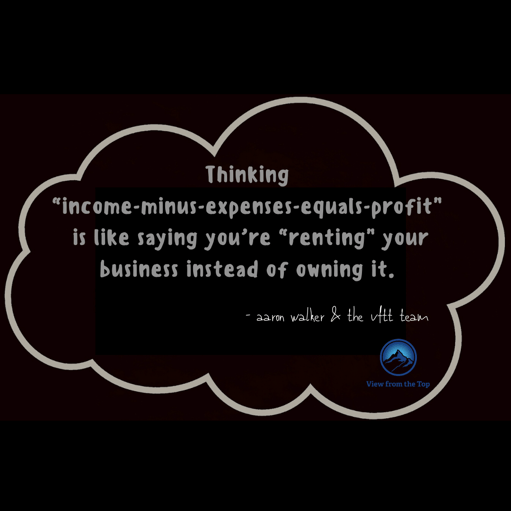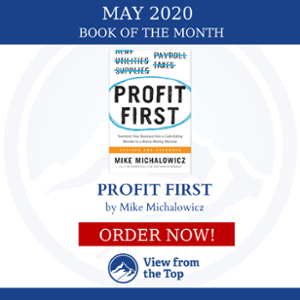
After the fallout from the coronavirus, our research showed that many men in our mastermind groups online needed more in-depth training. Two of the most scarce resources for many business owners are - you know them - time and money. So we offer and follow two distinct programs that address those topics. Money’s up first this month.
It’s not always fun to discuss dollars and cents in depth. I’d rather talk about them as they relate to other, more human issues - like spirituality or healthy marriage. We’re going to do some specifics in this series, but I suddenly remember a great saying from author Daryl Murrow: “People don’t have ‘business problems.’ They have personal problems they bring into their business.” Just substitute the word “financial” for “business”; it’s the same truth.
Luckily for you, as a business owner, there aren’t too many things that belong ahead of profit. Not if you learn to think holistically about each of the ones that do.
God is obviously one; we know there’s no sense putting profit ahead of Him, because He has the power to have you humbled. Family’s another; your wife and kids might seem more tolerant of you chasing dollars, but don’t count on it. Listen to your coaches, mentors or mastermind groups when they warn you about this! Then there are your customers. Listen to the marketplace; they hate gouging and unethical practices to line your pockets. Fourth is your team or employees; don’t make the mistake of underpaying them so you can afford luxuries. Last is government. All I can say about them is they don’t care how much or little profit you made. They’re going to want their cut, so make sure you can pay it.
So, Where Do We Put Profit First?
This isn’t actually a blog about what to put above profit. That’s self-explanatory. We’ve put together a list of things entrepreneurs struggle to rank below profit. You’d think it’s simple to put these things below profit, but the numbers keep telling a different story. If entrepreneurs didn’t have these problems, we wouldn’t hear about the failure rates we do.
Greed belongs behind profit. In the book Profit First, which we’re studying again in our online mastermind groups this month, Mike Michalowicz tells awkward and embarrassing stories of his own “successful failures.” The first time he sold one of his businesses to a Fortune 500 buyer, Mike writes that he went out and bought himself three brand new luxury cars.
Now you might think, “Aren’t profits the result of greed?” Not the way we look at it, and not the way Mike looks at it. A lot of people rely on the CPA definition of profit, which is “income minus expenses.” That’s “technically true.” Since mandatory expenses are paid, you’re now left with disposable income. You can do with it what you like, but that is an employee mentality about leftover money. You are a business owner; you have a different set of responsibilities now. It’s another reason to surround yourself with a master mind group full of other business owners who can tell if your thinking stinks.

Thinking “income-minus-expenses-equals-profit” is like saying you’re “renting” your business instead of owning it. Have you experienced the difference between moving out of a rental property and selling a home? One comes with a big check worth tens or hundreds of thousands of dollars for the equity value of the property. The other comes with a “check” to make sure you don’t owe the apartment complex for any damage to the paint or carpets. “Ownership” has a very similar meaning in business as it does with your residence. You have to make investments in it, maintain it, beautify it and keep it attractive enough to sell one day.
That’s why greed needs a good Southern style whipping with a switch. It’s about as worthless as gum on a boot heel. If you have “more money left over than month,” like my friend Dave Ramsey says, profit should go straight to the front of the line, into an account you’ve set up specifically for it to grow. That’s what Mike’s book teaches, and we encourage the men in our masterminds to follow it.
Pride also belongs at the “back of the back of the line” compared to profit. Mike goes on to tell the stories of how he not only became greedy, but also thought he’d discovered the “Midas Touch” for making businesses succeed. He started blindly throwing money at startup companies. He confessed to being unconcerned at the time whether those startups knew what they were doing. He could fix it himself, he assumed, if they made a mistake.
Pride takes an inflated view of oneself as it relates to disposable income. You might start thinking your money has some special sparkle inside, because it came from you. You’ve done so well building up your business and serving your customers that now your money has an “anointing oil” on it. As a Christian life coach, I plead with you not to take this attitude. You can’t imagine how badly things will turn out if you do.
Besides, if your business is profitable on paper, what sense does it make to begin investing that profit in other people’s businesses instead of your own? Going back to the rent vs. own analogy, this is like living in a rented apartment while putting several down payments on rental properties. That’s one thing if you already have massive personal and business nest eggs, and you’re renting a luxury beachfront condo. But if your business is starting to succeed and you’re not building up equity inside it, it’s going to be a hollow machine.
Guys, we want our businesses to be able to run, produce income and turn a profit whether we’re there to steer the ship hands-on or not. One of the ways to do this is to start your business in the habit of investing part of your gross receipts into an account that’s reserved to grow and pay out distributions. You can pay yourself, your team, invest in new equipment, purchase new property, training and coaching programs or gifts for your clients and customers. Those lead to high productivity, good morale and increased revenue.
When investors, buyers and brokers look at your overall assets and liabilities one day, a profit account that pays dividends like clockwork is an attractive feature. Taking your company public or attracting private investors will be easier if you can provide an expectation of immediate, passive income. Intelligent buyers, like high-end homebuyers, will always be on the lookout for a business that drips cash into the owner’s pocket. It’s like finding a home that has smart grid devices, auxiliary power generators and advanced security features built-in.
Does this resonate with you? Well, if your ears are tingling, I want you to apply to join one of our online mastermind groups so you can begin to structure your business in a way that puts God, people and social responsibility ahead of profit - while putting greed and pride way back where they belong - in a ditch a thousand miles deep.





